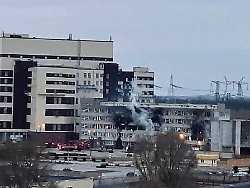Nuclear bombardment in Ukraine
Associations warn against “playing with nuclear fire”
3/10/2022 5:54 p.m
According to politicians and environmental organizations, the Russian attacks on nuclear power plants in the Ukraine make the nuclear danger alarmingly topical. Eleven years after the reactor catastrophe in Fukushima, the situation there is still critical. Holding on to nuclear power would be “baseless and cynical.”
Representatives of politics and environmental organizations urgently warn of the danger of nuclear power. “Eleven years after the multiple meltdowns in Fukushima, the situation on site is still very critical,” said Green environmental politician Stefan Wenzel. At the same time, the risks of nuclear power would again become “frighteningly topical due to the Russian war of aggression against Ukraine and the nuclear power plants there”.
This Friday marks the eleventh anniversary of the Fukushima nuclear disaster. With a view to the consequences, Wenzel spoke of an “oath of disclosure” for the industrial nation of Japan. “The Pacific has to serve as a dump for the sewage and speculation continues about the condition of the molten cores,” criticized the Green politician. “In addition, the molten fuel rods with enormous radioactivity are still lying in the damaged reactor buildings and cannot be recovered.”
Regarding the Russian attacks on nuclear power plants in the Ukraine, Wenzel said: “Below the threshold of a nuclear war, a hybrid war is being waged there – in the middle of Europe – that plays with people’s fears.” If, as in Fukushima, the power supply and emergency cooling fail, “there is a risk of a core meltdown or other uncontrollable situations with the reactors running.” In view of the risks of this technology, Wenzel clearly rejected calls for a postponement of the nuclear phase-out in Germany.
The chairman of the environmental association BUND, Olaf Bandt, called calls for a renaissance of nuclear power “baseless and cynical”. Referring to Ukraine, he said: “Once again we are learning that nuclear power is an intolerable security risk.” The nuclear energy expert Christoph Pistner from the Öko-Institut also said with regard to Ukraine: “The fact that acts of war are now taking place in the vicinity of nuclear power plants is deeply problematic and causes concern.” He also rejected adherence to nuclear power in Germany.
“Nuclear energy is nowhere safe to operate”
For the organization International Doctors for the Prevention of Nuclear War (IPPNW), Russia’s war against Ukraine shows “again the urgent need to become independent of nuclear energy and fossil fuels”. “Rocket impacts in the vicinity of active nuclear power plants such as Zaporizhia or the nuclear power plant in southern Ukraine are playing with nuclear fire,” warned IPPNW chairwoman Angelika Claussen.
Even if a reactor were only damaged by attacks and shut down, “it could heat up so much due to the loss of cooling water that there would be an explosion like in Fukushima,” Claussen explained. Even power cuts could trigger a meltdown that would affect people across Europe. She, too, was reminiscent of Fukushima. The catastrophe there had already shown: “Nuclear energy is nowhere safe to operate.”
The Fukushima nuclear power plant, located by the sea, was hit by an almost 15 meter high tsunami shortly after a severe earthquake on March 11, 2011. The power plant’s cooling system failed, and core meltdowns occurred in three of the six reactors. The disaster turned surrounding towns into ghost towns.
